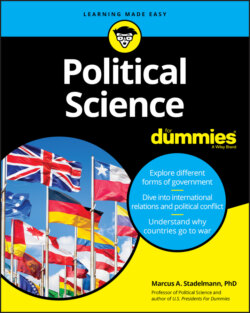Читать книгу Political Science For Dummies - Marcus A. Stadelmann - Страница 15
Being fragmented
ОглавлениеThe discipline of political science itself isn’t a cohesive discipline but actually is made up of various subfields, which in turn are broken down into more subfields. They are
American politics: The study of American politics involves studying American political institutions such as Congress or the presidency, as well as local or state governments. For example, the study of Texas politics falls into this category. Further, it includes the role of political parties and interest groups as well as the American electorate. Today, subfields within American politics have developed. They include public administration, which studies bureaucracies; public policy making; and the role of courts, which looks on the evolution of the constitution.
Comparative politics: Comparative politics studies other nations and cultures. It creates theories and frameworks that explain why and what happens and then identifies similar patterns and differences between political systems. Comparative Politics compares, for example, American culture to Swedish culture or looks at the voting behavior of Australians and compares it to U.S. voters. In addition, comparative politics studies various forms of governments (authoritarian, totalitarian, or democratic) and creates theories or concepts on the foundations for democracy (see Chapter 3).
International relations: International relations studies relationships between nation-states. It looks at international conflict, diplomacy, and international organizations and discusses issues such as human rights and terrorism. It also has two subfields: international political economy, which analyzes how economics and politics impact each other, and foreign policy studies, which looks at the interaction of countries with foreign nations.
Political theory: Political theory studies the great thinkers of the past and present. Most political scientists believe that the great Greek philosophers Aristotle and Plato set the foundation for political science. Political theory studies how and why people behave in a certain way politically and develops theories about the nature of people, the nature of liberty and freedom, ethics, and the role of the individual within a political system. It further includes studies on political ideologies, such as fascism, communism, and the various types of democracies.
